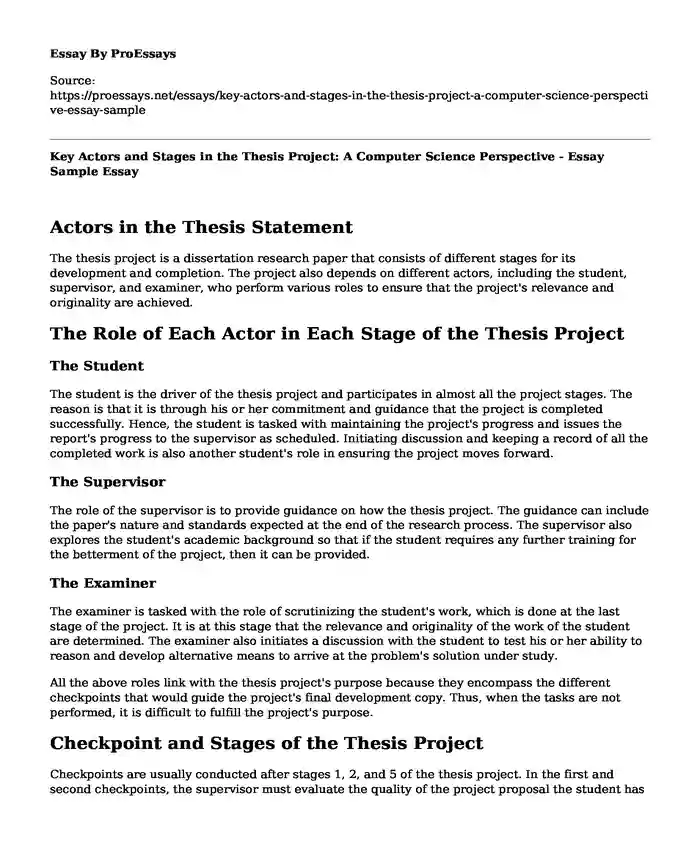Actors in the Thesis Statement
The thesis project is a dissertation research paper that consists of different stages for its development and completion. The project also depends on different actors, including the student, supervisor, and examiner, who perform various roles to ensure that the project's relevance and originality are achieved.
The Role of Each Actor in Each Stage of the Thesis Project
The Student
The student is the driver of the thesis project and participates in almost all the project stages. The reason is that it is through his or her commitment and guidance that the project is completed successfully. Hence, the student is tasked with maintaining the project's progress and issues the report's progress to the supervisor as scheduled. Initiating discussion and keeping a record of all the completed work is also another student's role in ensuring the project moves forward.
The Supervisor
The role of the supervisor is to provide guidance on how the thesis project. The guidance can include the paper's nature and standards expected at the end of the research process. The supervisor also explores the student's academic background so that if the student requires any further training for the betterment of the project, then it can be provided.
The Examiner
The examiner is tasked with the role of scrutinizing the student's work, which is done at the last stage of the project. It is at this stage that the relevance and originality of the work of the student are determined. The examiner also initiates a discussion with the student to test his or her ability to reason and develop alternative means to arrive at the problem's solution under study.
All the above roles link with the thesis project's purpose because they encompass the different checkpoints that would guide the project's final development copy. Thus, when the tasks are not performed, it is difficult to fulfill the project's purpose.
Checkpoint and Stages of the Thesis Project
Checkpoints are usually conducted after stages 1, 2, and 5 of the thesis project. In the first and second checkpoints, the supervisor must evaluate the quality of the project proposal the student has developed. After that, the student can be advised to make adjustments to propose better. The third checkpoint is done by both the supervisor and the examiner. At this stage, quality control is performed using software, such as Charm++ and AMPI, before the student can present and defend his or her thesis (Huang, 2004). When the checkpoints are conducted efficiently at these stages, the student will be able to maintain focus in handling the rest of the stages, leading to the development of a strong project thesis.
Relevance and Originality of the Thesis Project
In computer science, originality and relevance are highly valued since they offer self-evident importance to the student's scientific research. For this reason, originality is defined as the extent to which a particular scientific discovery offers a unique type of knowledge developed from the student's own. Specifically, a computer thesis project's originality is measured based on directed citations (Baptista et al. 2015). On the other hand, relevance in computer science provides that particular scientific knowledge should fill the particular knowledge that initiated the research process. This means that relevance addresses the specific problem of the thesis project. Therefore, the research process begins; the student needs to formulate the research paper's relevance, especially when introducing the topic. For example, in a computer science research project, the student needs to study the design and development of a particular software or hardware and how the design can help solve problems in different contexts (Baptista et al. 2015). When the research problem is addressed, then the project is considered relevant.
References
Baptista, A., Frick, L., Holley, K., Remmik, M., & Tesch, J. (2015). The Doctorate as an Original Contribution to Knowledge: Considering Relationships between Originality, Creativity, and Innovation. Frontline Learning Research, 3(3), 55-67: DOI: https://doi.org/10.14786/flr.v3i3.147
Huang, C. (2004). System support for checkpoint and restart of Charm++ and AMPI applications (Doctoral dissertation, University of Illinois at Urbana-Champaign).
Cite this page
Key Actors and Stages in the Thesis Project: A Computer Science Perspective - Essay Sample. (2024, Jan 09). Retrieved from https://proessays.net/essays/key-actors-and-stages-in-the-thesis-project-a-computer-science-perspective-essay-sample
If you are the original author of this essay and no longer wish to have it published on the ProEssays website, please click below to request its removal:
- Bullying in Schools in the United States Essay
- Learning and Hopfield Networks Essay Example
- Developing Critical Thinking Skills: A Guide to Success - Essay Sample
- Essay Example on Writing a Cultural Autobiography: Exploring Your Life Story
- Essay Example on Secure Data Sharing: Packet Filtering Strategies
- Essay Example on Staff Development: Improving Teacher Induction Programs
- Paper on Unveiling the Roots of Crime: A Criminological Analysis of Kody's Journey into Deviancy







